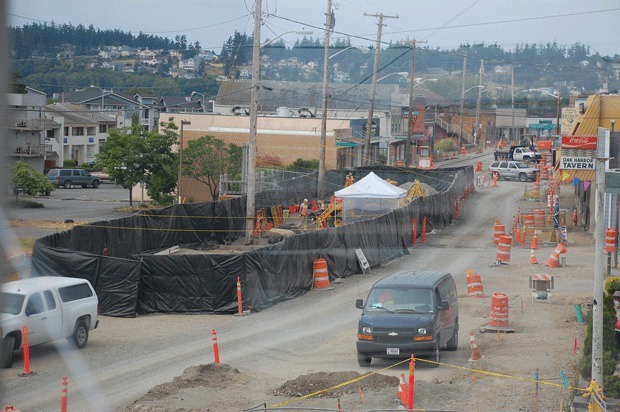The ordeal that began when a worker noticed a human bone in a pile of dirt during the Pioneer Way construction project in 2011 may finally be reaching a conclusion.
Members of the Oak Harbor City Council unanimously adopted settlement agreements with the Swinomish Tribe during a special meeting Tuesday.
The tribe will receive a two-acre piece of city property and $2 million from the insurance providers for the city and three contractors.
City Councilman Bob Severns and Councilwoman Beth Munns were absent from the meeting.
The Swinomish filed a lawsuit against the city and the contractors involved in the Pioneer Way project for the desecration of a Native American burial ground.
The city was warned by state officials about the possibility of cultural artifacts in the area, but neglected to hire an archaeologist as recommended.
The city already spent about $3.5 million on archaeology and other costs associated with the unearthing of the burial ground, the city engineer estimated.
Dirt containing the sensitive items were piled on public and private property all over the city; archaeologist had to sift through thousands of square foot of earth.
On Tuesday, council members went into executive session and then came out and quickly passed the agreements without any discussion about the details.
The terms, however, appeared to be identical to the preliminary information reported by the Whidbey News-Times in March, according to city Finance Director Doug Merriman.
The tribe will receive a total of $2 million from the city’s and the contractors’ insurance providers.
Merriman said he isn’t sure of the exact percentages, but City Administrator Larry Cort previously said the city’s insurance provider will cover $1.2 million.
In addition, the city will turn over the deed to old city shop to the tribes for a cemetery for all the recovered remains, artifacts and possibly even the dirt in which the items were buried.
The two-acre property is located at the top of Southeast City Beach Street. Assessed value is more than $600,000, according to the Island County Assessor’s website.
Archaeologists recovered more than 4,300 human bones or bone fragments, nearly 17,000 non-human bone fragments and more than 44,000 “pre-contact or historic artifacts or artifact fragments,” according to a declaration by M. Brian Cladoosby, chairman of the Swinomish Indian Tribal Community.
Merriman said there are details that need to be figured out, but the settlement probably won’t come back to the council unless something significant changes.
“One thing that needs to be worked out is how do we transfer a deed between a municipality and a tribe,” he said, adding that the city still wants to have zoning control over the property.



